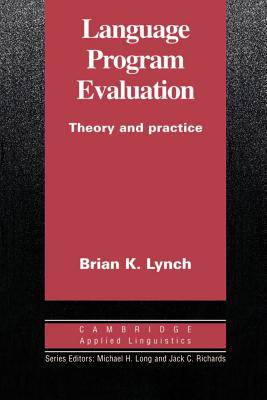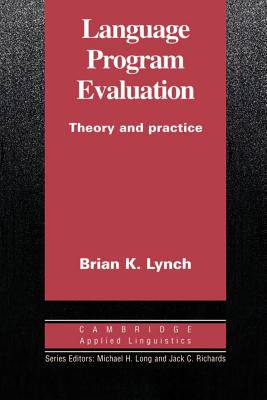
Door een staking bij bpost kan je online bestelling op dit moment iets langer onderweg zijn dan voorzien. Dringend iets nodig? Onze winkels ontvangen jou met open armen!
- Afhalen na 1 uur in een winkel met voorraad
- Gratis thuislevering in België vanaf € 30
- Ruim aanbod met 7 miljoen producten
Door een staking bij bpost kan je online bestelling op dit moment iets langer onderweg zijn dan voorzien. Dringend iets nodig? Onze winkels ontvangen jou met open armen!
- Afhalen na 1 uur in een winkel met voorraad
- Gratis thuislevering in België vanaf € 30
- Ruim aanbod met 7 miljoen producten
Zoeken
Omschrijving
Although much has been written about the testing and evaluation of language students, few books have dealt with the much broader issue of measuring the success of language programs. Filling a critical gap in the literature of applied linguistics, Language Program Evaluation provides teachers, researchers, and administrators with a complete introduction to both qualitative and quantitative approaches to evaluating the effectiveness of their programs. Through a careful blend of theory, research, and practice, the author presents a testing model that is specifically tailored to the concerns of language education programs and which can be adapted to different contexts and updated as teaching and learning situations evolve. He proposes a shift from purely quantitative studies which consider only end-of-program achievement gains to ones that include an investigation of program process using qualitative, naturalistic methods.
Specificaties
Betrokkenen
- Auteur(s):
- Uitgeverij:
Inhoud
- Aantal bladzijden:
- 212
- Taal:
- Engels
- Reeks:
Eigenschappen
- Productcode (EAN):
- 9780521484381
- Verschijningsdatum:
- 24/11/1995
- Uitvoering:
- Paperback
- Formaat:
- Trade paperback (VS)
- Afmetingen:
- 153 mm x 229 mm
- Gewicht:
- 294 g

Alleen bij Standaard Boekhandel
+ 200 punten op je klantenkaart van Standaard Boekhandel
Beoordelingen
We publiceren alleen reviews die voldoen aan de voorwaarden voor reviews. Bekijk onze voorwaarden voor reviews.











